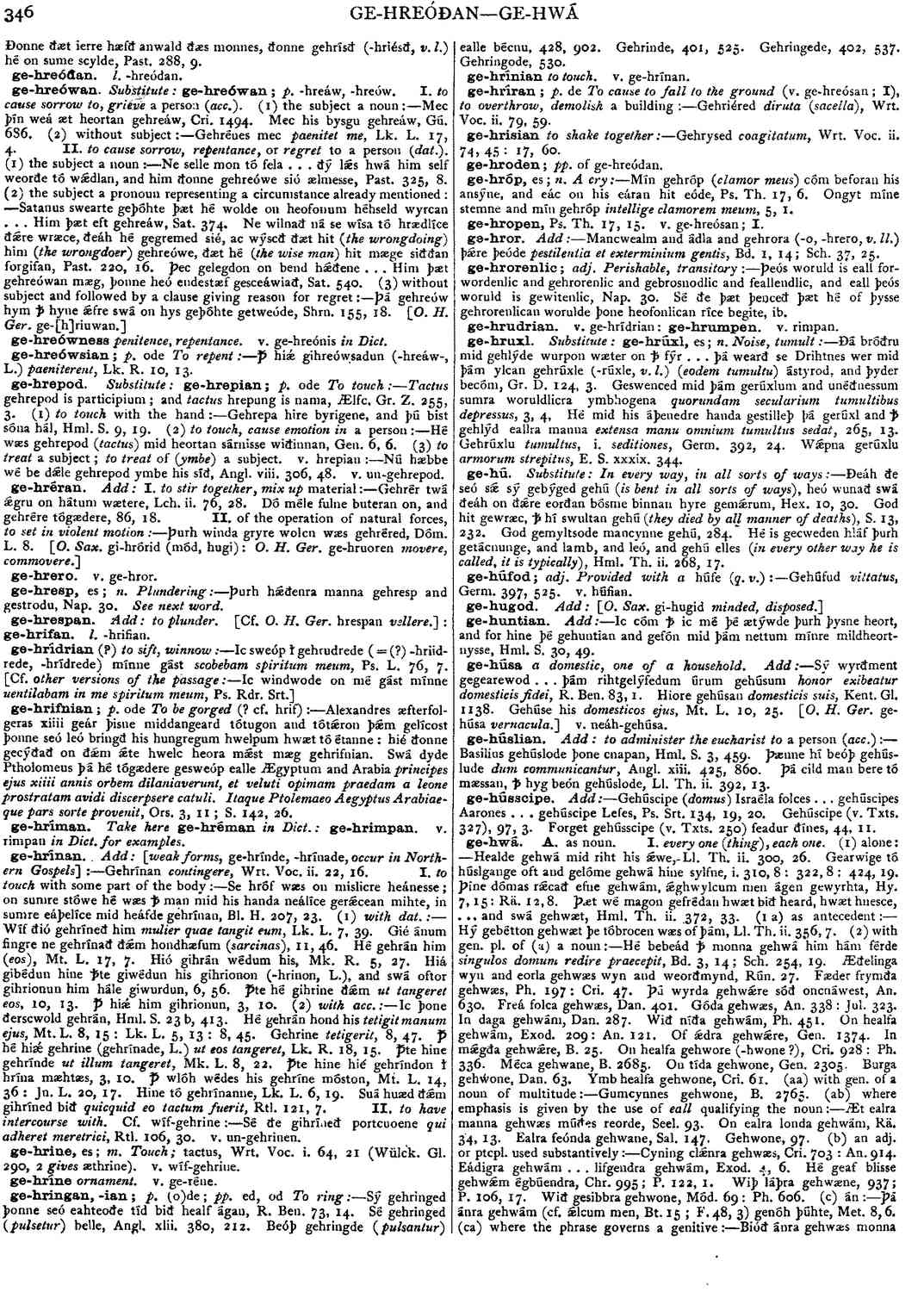ge-hwá
- noun [ masculinefeminineneuter ]
- adjective
- pronoun
- Healde gehwá mid riht his ǽwe, -Ll. Th. ii. 300, 26.
- Gearwige tó húslgange oft and gelóme gehwá hine sylfne, i. 310, 8 : 322, 8 : 424, 19.
-
Þíne dómas rǽcað efne gehwám, ǽghwylcum men ágen gewyrhta,
- Hy. 7, 15: Rä. 12, 8.
-
Þæt wé magon gefrédan hwæt bið heard, hwæt hnesce, . . . and swá gehwæt,
- Hml. Th. ii. 372, 33.
- (l a) as antecedent :-- Hý gebétton gehwæt þe tóbrocen wæs of þám, Ll. Th. ii. 356, 7.
-
Hé beheád ꝥ monna gehwá him hám férde
singulos domum redire praecepit
,- Bd. 3, 14; Sch. 254, 19.
-
Æðelinga wyn and eorla gehwæs wyn and weorðmynd,
- Rún. 27.
-
Fæder frymða gehwæs,
- Ph. 197 : Cri. 47.
-
Þá wyrda gehwǽre sóð oncnáwest,
- An. 630.
-
Freá folca gehwæs,
- Dan. 401.
-
Góda gehwæs,
- An. 338 : Jul. 323.
-
In daga gehwám,
- Dan. 287.
-
Wið níða gehwám,
- Ph. 451.
-
On healfa gehwám,
- Exod. 209: An. 121.
-
Of ǽdra gehwǽre,
- Gen. 1374.
-
In mǽgða gehwǽre,
- B. 25.
-
On healfa gehwore (-hwone?),
- Cri. 928 : Ph. 336.
-
Méca gehwane,
- B. 2685.
-
On tída gehwone,
- Gen. 2305.
-
Burga gehwone,
- Dan. 63.
-
Ymb healfa gehwone, Cri. 61. (aa) with gen. of a noun of multitude :-- Gumcynnes gehwone, B. 2765. (ab) where emphasis is given by the use of
eall
qualifying the noun :-- Æt ealra manna gehwæs múðes reorde,- Seel. 93.
-
On ealra londa gehwám,
- Ru. 34, 13.
-
Ealra feónda gehwane,
- Sal. 147.
- Gehwone, 97.
-
Cyning clǽnra gehwæs,
- Cri. 703 : An. 914.
-
Eádigra gehwám . . . lifgendra gehwám,
- Exod. 4, 6.
-
Hé geaf blisse gehwǽm égbúendra,
- Chr. 995; P. 122, I. Wiþ láþra gehwæne, 937; P. 106, 17.
-
Wið gesibbra gehwone,
- Mód. 69 : Ph. 606.
-
Þá ánra gehwám (cf. ǽlcum men,
- Bt. 15 ; F. 48, 3) genóh þúhte, Met. 8, 6. (ca) where the phrase governs a genitive :-- Bióð ánra gehwæs monnamódsefan áwegede, Met. 7, 23, Ánra gehwǽm eorðbúendra, 12, 18.
-
On ánra gehwám æðeles cynnes,
- Exod. 227.
- Gumena gehwæne þyssa burhleóda. Jud. 186. (cb) with demonstrative
Is þára ánra gehwám orgeate tácen. Sch. 8.
-
Him on scínað ǽrgewyrhtu, on sylfra gehwám,
- Cri. 1242.
-
Búton gehwá beó geedcenned of wætere and of þám Hálgan Gáste, ne mæg hé faran in tó heofenan ríce
nisi quit renatus fuerit ex aqua et spiritu, non potest introire in regnum Dei
,- Hml. Th. i. 94, 10.
-
Þone mete þe gehwá brúcan wolde, gif him þæt fæsten swá geboden nǽre,
- Wlfst. 181, 12.
-
Þonne hé sǽde gehwæt (mé hwæt rehte,
v. l.
) be ealdra manna dǽdum,- Gr. D. 86, 22.
-
Hé (
the interjection
) getácnað hwílon ðæs módes blisse, hwílon sárnysse, hwílon wundrunge and gehwæt,- Ælfc. Gr. Z. 278, 6.
- (la) as antecedent :-- Ic gehwám wille þǽrtð tǽcan þe hiene his lyst má tó witanne, Ors. 3, j; 8. 102, 24.
-
For gehwæt heardes oððe hnesces . . . þæs ðe mé innan oððe útan gebyrede,
- Angl. xi. 98, 52.
-
Scealt þú georne geþolian gehwæt þæs þe tó heora þénungum belimpþ
aequo animo toleres oportet quidquid intra fortunae aream geritur
,- Bt. 7, 2 ; F. 18, 25.
- Wǽpnu and mete and ealo and cláþas and gehwæt þæs þe þá þré geférscipas behófiaþ, 17 ; F. 60, 5.
-
Nis hit nán wundor ðeáh hwá wéne ꝥ swylces gehwæt (hwæt,
v. l.
) unmyndlinga gebyrige,- Bt. 39, 2 ; F. 214, 9.
-
Oft gehwá gesihð fægre stafas áwritene, þonne herað hé ðone wrítere, Hml. Th. i. 186, 2. ꝥ is lǽsse, ꝥ man wite gehwæt hwylces, þonne ꝥ sý, ꝥ his man wite and eác bodie, Gr. D. 138, 2. B. as adjective,
every
:-- Ríces gehwæs,- Dan. 114.
- Be naman gehwám, 424.
-
Gange of dóme gehwám deópe gehýned
cum judicatur, exeat cotidemnatus
,- Ps. Th. 108, 6.
-
On mǽgðe gehwǽre,
- Fä. 74.
-
In ceastre gehwǽre,
- El. 973.
-
On stówe gehwáre,
- Cri. 490 : Ph. 206.
-
Tó yfele gehwám scearpe,
- Ps. Th. 56, 5.
- Æt leóhte gehwám, 62, I.
Bosworth, Joseph. “ge-hwá.” In An Anglo-Saxon Dictionary Online, edited by Thomas Northcote Toller, Christ Sean, and Ondřej Tichy. Prague: Faculty of Arts, Charles University, 2014. https://bosworthtoller.com/48426.
Checked: 0